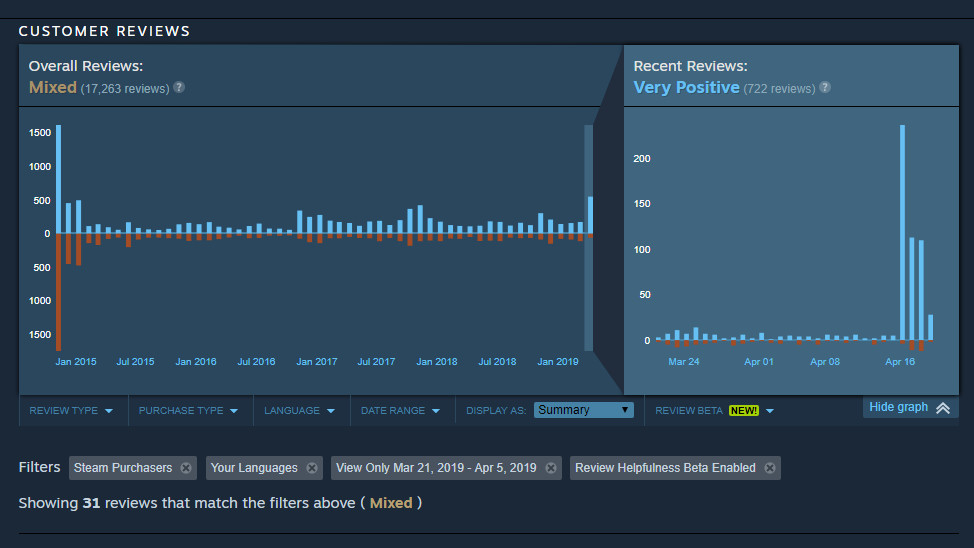Whenever online user reviews come up, you’ll usually elicit a bunch of groans and complaints. Despite being a place where consumers can be directly heard, it’s largely turned into an area filled with trolls or apologists. The bad reputation has been earned through years of misuse, especially when coordinated attacks happen where groups give negative reviews to a game en masse. This is called review bombing, and it’s one of the main reasons why user reviews are widely viewed as useless. While review bombs are mostly stupid and juvenile, they serve an important purpose in that they allow the users to be heard be it good or bad.
A lot of praise has been paraded upon Epic because of the the Epic Games Store’s lack of user reviews. This is certainly good news for publishers that want their marketing spiel and trailers to sell the game to consumers rather than reading impressions from people that have actually played the game. Word of mouth is always important, and it’s a great side effect to have if you can get a buzz going, but they often want to avoid any sort of backlash far more than they want to create a natural phenomenon. After all, a game that catches on after millions of dollars were put into advertisements and influencer campaigns is anything but natural in nature.
By removing user reviews, Epic is guaranteeing that it’s harder to find out about important information like marketing ruses, broken features, and gameplay issues. This removal isn’t a plus for the consumer, but rather the product manufacturer that just wants to regale potential buyers with how great their game is. Considering the storefront is on PC, this becomes an even more important talking point as there are a number of broken ports and compatibility issues that come along every couple of months.
This sort of information deserves to be known, and it’s not as if all developers are going to list off all the known issues and shortcomings. Transparent developers do exist, and this level of communication has become increasingly important thanks to early access titles, but obscuring this sort of information can’t be construed into a net positive. This is making it so that people only find out about issues if they know how to search for them.
User reviews do have plenty of issues

While user reviews have the ability to do a lot of good, such as warning players about shortcomings or giving a positive review to an under-the-radar title, there are still a lot of issues with them. As mentioned above, review bombing is still alive and well. Oftentimes these reviews come in due to things that are largely unrelated with the game itself, such as the actions of someone that worked on the game or a decision by the company itself. At its worst, it becomes a coordinated harassment against a worker.
To combat these attempts at swaying the user review infrastructure, Steam has put in place a measure where reviews can be marked as “off-topic” in the database and reviews during that time period will then be disregarded as far as the review score goes. That said, Valve isn’t deleting reviews and it’s still possible for players to enable an overall review score that takes the off-topic ones into account.
It’s not a perfect fix, but it’s an important step to be made in making user reviews representative of users as a whole and not just one angry subsection. Even though it’s important they can be heard as well, they just can’t be heard in a disproportionate degree.
More recently, we’ve been introduced to another type of review bomb that publishers would love to see happen to them as Assassin’s Creed Unity received an influx of positive reviews after the fire that impacted the Notre Dame cathedral. This was in response to Ubisoft having done a great job of recreating what the historical building looks like.
That appreciation comes from a sincere and real place, just like a lot of the anger of most review bombs, but it’s definitely not relevant to most people that want to play the game. Steam decided to leave the scores up in this case, after combing through reviews and finding most of them to be on topic, but this probably won’t be the last time something like this occurs.
Another inherent issue with user reviews is that humans are inherently more likely to complain about something that was bad than to praise something they enjoyed. After all, if you paid money for a game only to encounter a game-breaking bug or glitch, you’d probably be pretty pissed off and more likely to go out and write a (rightfully) scathing review on the matter.
However, if that bug didn’t occur and you merely had a good, yet non-groundbreaking, time with the game then you probably would have just moved on with your day rather than taking the time to write about it. This is just a side-effect of human nature and user reviews will never fully tell the story unless humans start expressing the gratitude more regularly.
Can user reviews be fixed or is it a lost cause?

While user reviews will always be inherently flawed, there are ways to improve them and make sure they’re useful. First off, transparency is important and Steam does a great job of showing how much time someone has put into a game alongside their review. This makes it easy to disregard those that spent 10 minutes with it and then listed a bunch of off-topic points. However, it also helps you get a good measure of how long people are spending with the game, which would make their opinion a bit more valid. This also counts for the hilarious, nearly hypocritical negative reviews where a person trashes the game after putting 600 hours into it.
Given the potential for abuse and muddying up the message, there will never be a perfect system in place as user reviews will always reflect humans. And like humans, user reviews are messy, oftentimes misguided, but there is some good to be found and they serve an important purpose that shouldn’t be taken for granted. In the days where publishers are looking for more and more ways to screw its customers over, these user reviews are an imperfect but effective way to give users a voice.







